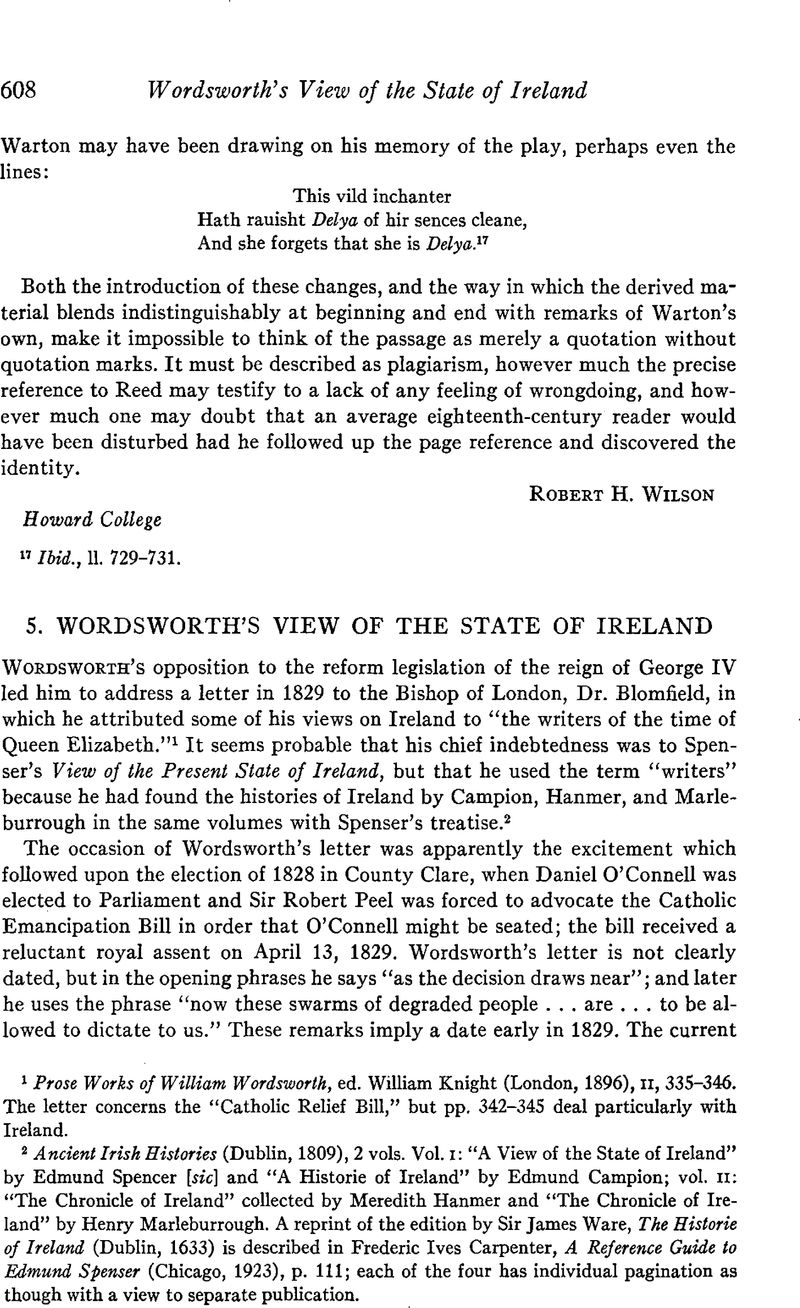Article contents
Wordsworth's View of the State of Ireland
Published online by Cambridge University Press: 02 December 2020
Abstract

- Type
- Comment and Criticism
- Information
- Copyright
- Copyright © Modern Language Association of America, 1940
References
1 Prose Works of William Wordsworth, ed. William Knight (London, 1896), ii, 335–346. The letter concerns the “Catholic Relief Bill,” but pp. 342–345 deal particularly with Ireland.
2 Ancient Irish Histories (Dublin, 1809), 2 vols. Vol. i: “A View of the State of Ireland” by Edmund Spencer [sic] and “A Historie of Ireland” by Edmund Campion; vol. ii: “The Chronicle of Ireland” collected by Meredith Hanmer and “The Chronicle of Ireland” by Henry Marleburrough. A reprint of the edition by Sir James Ware, The Historie of Ireland (Dublin, 1633) is described in Frederic Ives Carpenter, A Reference Guide to Edmund Spenser (Chicago, 1923), p. 111; each of the four has individual pagination as though with a view to separate publication.
3 Prof. George M. Harper, in William Wordsworth (New York, 1916), ii, 357, dates the trip 1830; but Letters of the Wordsworth Family, ed. William Knight (Boston, 1907), ii, 381–393 prints seven letters referring to the trip, of which five are dated or postmarked 1829.
4 Early Letters of William and Dorothy Wordsworth, ed. Ernest de Selincourt (Oxford, 1935), p. 312; Selincourt suggests that the John referred to might be John Wordsworth preparing books for a voyage.
5 Letters of Charles and Mary Lamb, ed. E. V. Lucas (New Haven, 1935), i, 378. Wordsworth arranged to have £ 10 advanced to Lamb for purchasing books the next December (Early Letters, p. 430).
6 London, 1679; London, 1715; and London, 1750: see Carpenter, op. cit., pp. 111–112.
7 See Carpenter, op. cit., pp. 206–216, and Dorothy F. Atkinson, Edmund Spenser, A Bibliographical Supplement (Baltimore, 1937), pp. 153–161.
8 “. . . I had been sadly disappointed with Todd's Spenser . . . three parts of four of the Notes are absolute trash.”—Letter to Walter Scott, Nov. 7, 1805, Early Letters, p. 540.
9 Ancient Irish Histories, i, 5–6.
10 Op. cit., pp. 16–17; see also Spenser on the unsuitability of English common law for Ireland, pp. 32–35, 38–47. The confusion and distress caused by the discrepancies of English statute law and native Irish law are treated pp. 47–56.
11 Hanmer, for example, cites without comment an instance in which Henry II directed that English law should supersede Irish law in the method by which orphaned girls should render homage (op. cit., ii, 385–387).
12 Op. cit., i, 70–72.
13 Op. cit., pp. 7–8.
14 Op. cit., p. 23.
15 Op. cit., pp. 157–160, 188–190, 201–203, 208–209, 212–217.
16 Op. cit., p. 111.
17 Op. cit., pp. 264–265.
18 Op. cit., pp. 133–136.
19 Op. cit., pp. 261–262.
20 Op. cit., p. 202.
21 Op. cit., p. 20.
22 Op. cit., p. 82.
23 Op. cit., pp. 82–83.
24 Op. cit., p. 157: “he is a flying enemie, hiding himselfe in woodes and bogges . . . to seeke him out that still flitteth, and follow him that can hardly bee found, were vaine and bootlesse; but I would devide my men in garrison upon his countrey . . .”
25 Op. cit., “Historie,” p. 74.
26 Op. cit., p. 27.
- 1
- Cited by


